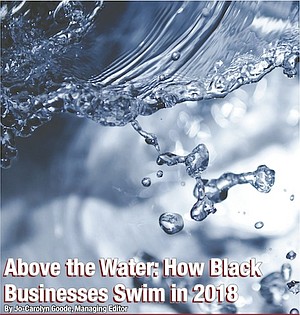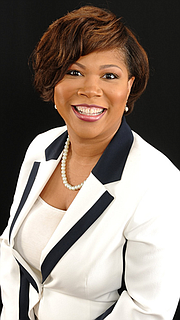2/2/2018

Simply being business is hard enough. Compound that with being Black-owned and a disaster like Hurricane Harvey and the definition of sinking or swimming takes on an entirely new meaning. In the aftermath of Hurricane Harvey, many entrepreneurs had the difficult teeter-totter task of balancing the rebuild of their home life and business life. As a result, many businesses closed, especially those that were Black-owned. However, there were some that were able to float instead of sink. Courtney Johnson-Rose, current Greater Houston Black Chamber of Commerce (GHBCC) Board Chair, spoke with Houston Style Magazine to give insight on how those Black-owned businesses that survived stayed above the water in 2018 in celebration of Black History Month.
According to Johnson-Rose, disasters bring more than destruction to any place they hit. They bring big dollars and even bigger opportunities to make one look at how to pull resources. Recognizing that the GHBCC knew there were some key things that they had to do as an organization to help businesses recover from Hurricane Harvey. Their plan had three main goals:
1) Disaster Relief – offering grants and other sources of financial assistance to start the rebuilding process
2) Be a Resource Center – providing information about business development and pulling resources from other Black business owners
3) Get Involved in the Procurement Process – offering information about business opportunities with the City of Houston
It is not too different from what they already were doing; it was just being done on a more escalated scale. Five months post-Harvey and their efforts seem to be working.
Black entrepreneurs’ main challenges with starting and staying in business have always been the same for years. Getting access and gaining capital have slipped through their grasps hindering them from getting needed staff, equipment, and other tools for success. Home equity loans are one of the main sources of capital. But take one look at homeownership rates and it is obvious to see that Blacks have the lowest rates of all. Then there are the barriers to the bank many faced in trying to gain credit loans. Hurricane Harvey made those challenges worst because many business owners had not prepared themselves to handle such a disaster, similar to many homeowners. “Harvey further accelerated that for businesses that were hit because what it does is takes away operating time.” Johnson-Rose continued stating those businesses that were affected could not get SBA loans, the number one tool for business post-hurricane. During times of disaster, a majority of those loans were for families and not many were for businesses. The lack of income and resources for businesses that did not prepare for such time of emergency left them not being able to handle the stressors and many closed their doors for good.
GHBCC saw that need and answered the call that kept some business above the tide by referring members to available grants and the disaster relief page still housed on the Chamber’s website. Other avenues with the Houston Business Development, Inc., List Fund, and Texas Capital Bank were made accessible. Ten entrepreneurs were awarded grants by the GHBCC in the amount of $10,000 to aid in the rebuilding process for affected businesses.
Nothing beats an entrepreneur’s own tenacity and determination except when it is pulled with others of like minds like the Chamber did with their matchmaking sessions of those of liked industries. Entrepreneurs were able to dialogue with others to better discover what worked and what didn’t work. That valuable information was used with connections made to better each other for the success of all instead of just some. “They had to roll up their sleeves and make it happen,” said Johnson-Rose.
As the city continues to recover and the economy rebuilds support is crucial in the recovery process. Of course, the number one way to support is to buy Black. Familiarity helps in finding those businesses. A good resource guide is the Chamber sponsored Buy Black Directory. Now in its 2nd edition, the directory serves as a resource guide for cooperative economics for those seeking to do work with Black-owned businesses. It is a resource tool for supply & diversity managers, procurement managers, visitors’ bureaus, etc. And lastly, it is a benefit for GHBCC members as listings of businesses is free with membership to the Chamber. Over 1,000 businesses are listed in the directory and more information can be found online at HoustonBuyBlack.com.
Just like it takes a village to raise a child, it takes a community to build a business. For 83 years, the GHBCC has been doing its part to give Black-owned businesses of all entities access to business development opportunities, be an advocate for their interests with legislative policies, and to make the community aware of the quality Black-owned businesses in the Houston area.
“Houston is a special place. The diversity of Houston really opens the door for African American businesses to succeed,” said Johnson-Rose. “Houston is very diverse not just in population but also industry. There is a booming economy, a lot of construction, and a lot of new development happening. It is a great place for any business, particularly minority businesses, to take advantage of all of the growth happening in the greater Houston market.”
Celebrate Black History Month by supporting a Black-owned business to help the economy, support job creation, build communities, better tomorrow for the next generation and to keep Black-owned business above the water.
Courtney Johnson-Rose is a business owner of her family run owned and operated full real estate development firm, the George E. Johnson Development. She considers it a blessing to have been in business for 42 years with the help of the Chamber.

